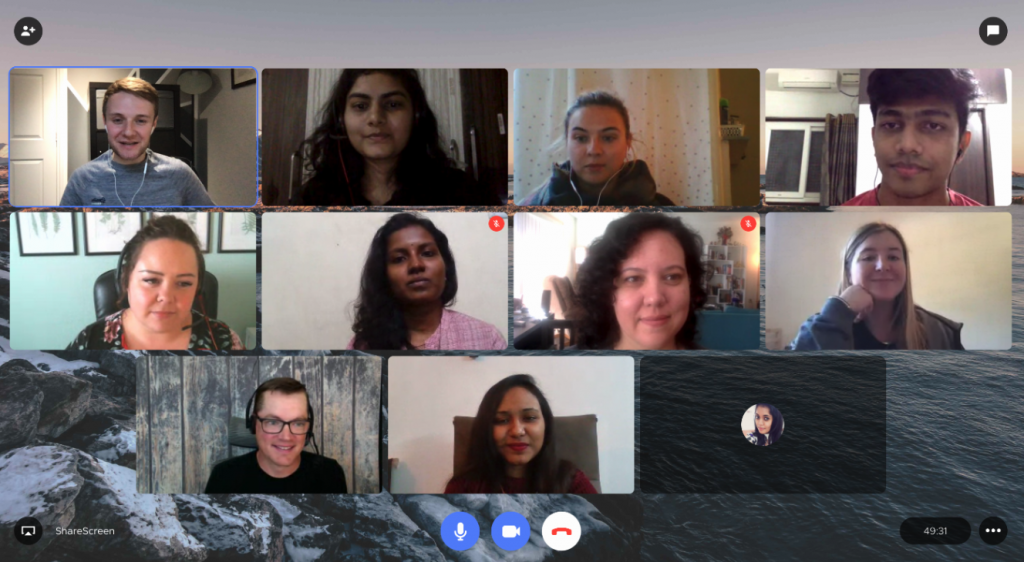
Company Interview with Fraser, Global Head of Marketing at AnswerConnect
What made you develop a remote work policy for your company?
We developed our remote work policy in response to several factors. From our first office in Portland, some of our team had to commute up to two hours every day. We realised this wasn't the most efficient way for people to work. Not only does commuting (by car or public transport) cost a significant amount of money, it’s also terrible for the environment.
With home internet connection reaching a point where people could effectively create the connections of the office from home, it felt like the best move. Our distributed model also means we aren’t limited in our hiring process.
We can hire the best person for the role, not just the best person within range of the office. This has been valuable for our growth as a business.
Read 7 answers from other remote workers
What has been the benefit of allowing remote work?
Remote work comes with a variety of benefits. Not only does dropping the commute give everyone some added time back in their day, but it also allows our team to create a work environment that suits them. That freedom is crucial to staying motivated, relaxed, and organised.
Another significant benefit to our flexible work model; in the UK, we’re able to work asynchronously with our team in Chennai and in our team in Portland. With teams distributed across time-zones, it gives us the flexibility to deliver projects under time constraints as we have people working at all hours of the day globally.
Read 10 answers from other remote workers
What have been some of the challenges?
Remote working teams face a few challenges. Conveying tone can be a challenge. After all, if you spend all day communicating with people through text alone, it’s easy to miss the nuances behind what they’re saying.
But most instant messaging apps (including our own AnswerConnect.App) allow you to include pictures, emojis, and GIFs in your messages, so there’s less room for misinterpretation - we love an emoji!
The most common issue when everyone works from a respective location, however, is something I call The Workload Iceberg. You know how it goes; a colleague is working on a small part of a project with you. “Heck,” you reason, “they’re only working on a small part. They could probably take on more responsibility.”
But your colleague could also be working on several other time-consuming projects in other areas of the company. You’re only seeing the tip of their workload because you’re not involved in the other projects. To avoid this, we ask everyone to share ‘Updates’ through the internal comms app (mentioned below). Essentially designed to act as a social media feed, status updates enable everyone to share their current workload (and priorities) with everyone in the company.
Besides that, we try to avoid prioritising one time-zone.
With people based across three continents, you have to consider everyone before you start scheduling meetings. I think if one team had to do all the late night or early morning calls each time, they’d have grounds to complain!
Read 13 answers from other remote workers
Do you have a hybrid or full-remote team?
Prior to the Covid-19 outbreak, we had the option to work from our offices (in Edinburgh, UK, Portland, USA, and Chennai, India, respectively). Still, many people chose to work from home before that. Of course, with the onset of covid-19, we moved to a 100% fully remote model.
Read 12 answers from other remote workers
What are your company's most popular tools?
We use our own internal comms tool (the AnswerConnect.App) to stay in touch on a regular basis. You can chat with anybody in the company just by searching their name, but you can also create group ‘collabs’ for projects.
There are lots of ways you can organise these collabs, but we’ve found breaking them up by field (ie content, sales, design, etc.) works best, with one Master Collab to send daily updates to the whole team.
We also use a combination of Trello, email, video calls, and Google Docs/Sheets/Slides, the latter allows us to literally work from the same page!
We start the week with a full group catch up via our video-conferencing tool Teleport.video. Everyone is given their own time slot to share the tasks they’ve been working on and discuss what they plan to work on in the coming week.
We try to start every meeting with action points and deliverables already set out. Our aim is that everyone leaves a video call with a clear idea of the next steps, timeframes, and key collaborators.
A clear company structure is essential to efficient workflows and avoiding bottlenecks.
We also use YoCoBoard as a digital time-tracking tool, so people can clock-in and out. It’s important to ensure people work their contracted hours, but, for my team, I encourage clocking out to be a kind of symbolic act that tells them it’s time to switch off from work and enjoy personal time.
Read 12 answers from other remote workers
What does a typical day look like for your remote teams?
Although it may be a cliche—no two days are the same at AnswerConnect! A typical day usually involves some core aspects; touching base with team members, sharing work with managers for review, identifying areas of focus, and flagging any obstacles.
We all chat regularly via the AnswerConnect.App and are in and out of video meetings using Teleport.video with different people throughout the day.
Read 11 answers from other remote workers
How do you support or train your remote managers?
Training can be as simple as sharing new employees into the best practices, which we provide through our shared learning platform AdaptiveU.
Our team is completely distributed across multiple continents, so we tend to err on the side of over-communication. Our HR Managers dedicate time to helping new employees adjust, and I find the sooner you can convey the communication culture to them, the better they are at adapting to it.
It’s about creating a shared culture, where everyone can contribute and collaborate. That means engendering trust, transparency, and accountability, and we try to do that in every communication.
Read 12 answers from other remote workers
Do you have a formal remote work policy?
As with most businesses, we have employee handbooks, guides, systems, and procedures when it comes to our work.
These mainly cover the systems our employees use, best practices for communication, and requirements for day-to-day operations e.g., internet speed.
We encourage an open line of communication across all team members to ensure that everyone feels part of the team and is comfortable with expectations when based at home.
Read 11 answers from other remote workers
How has the role of HR changed when it comes to supporting your remote workforce?
As we have been very early adopters of remote working, we like to think that our business has grown around this as a core concept and is part of our make-up.
The HR team is always accessible for all employees, which we think is really important when people are working remotely. Via our internal app, the HR team can be contacted instantly to cover any questions our employees have. We also have HR systems and an intranet page for formal updates.
Read 10 answers from other remote workers
How do you build trust and camaraderie among your remote workers?
I can’t speak for everyone, but I have to say our Friday newsletter is my favourite. We choose a new theme each week, often focused on one of the various cultures that make up our team!
We ask for contributions to competitions so everyone can participate, and every newsletter comes with a quiz around a particular theme.
It’s great for showing the more human side of the team. We spend so much time in work-mode, only interacting around projects, that we can forget we’re talking to real people.
That’s one of the biggest challenges for remote teams—developing a real community that isn’t entirely formed around work.
We also create custom collabs in our internal comms platform for discussing non-work stuff, like food, music, and sport. These collabs are crucial to group cohesion, bringing people together across departments who might not otherwise interact.
Read 12 answers from other remote workers
Do you facilitate opportunities for face-to-face interactions?
We try to at every turn. Although meeting in person just isn’t possible (or advisable) right now due to the pandemic, we’ve designed a video-first culture, which means our teams are always prepared to join a video-link call.
Operating remotely, we recognise the value of simulating a real office environment. This includes the importance of communicating with body language and conveying tone of voice. When these are built into our communication, we’re better equipped to offer one another a personal level of support and understanding.
We also want to ensure the culture remains inclusive, and everyone feels that they are a valued team member. Video helps make that possible.
Read 11 answers from other remote workers
How has remote work impacted your company's productivity?
Productivity is directly tied to how well a business enables its employees. Quite simply, it’s all about preparation and purpose.
Figure out the who, what, how, why, and when before a call, and you’ll accomplish a lot more. Set time limits for video calls based on what you plan to cover.
Some of our team even make a checklist of key points to ensure they don’t miss anything and the call stays on subject. As a team, we are massively delivering and I know this is because everyone is on the same page, and every single person’s contribution is valued.
Read 10 answers from other remote workers
What are the benefits of building a remote team?
In a word, diversity. As a global company operating in a distributed model, we have built a very diverse team, which is a massive benefit for us.
Having a diverse range of people from different geographical locations and with different backgrounds enable us to take consideration of different perspectives and ensure that everything we produce is of the highest quality and value.
It is also beneficial in terms of our team’s work-life balance as they are able to save their commute time and spend this time instead with family, friends, hobbies etc.
Read 12 answers from other remote workers
What are the challenges of building a remote team?
Communication and a sense of belonging are two of the biggest challenges when it comes to building a remote team. At AnswerConnect, we directly combat these challenges by making a point of airing on the side of over-communication.
All employees use our internal communication software, have regular video calls with other team members, share status updates, receive company-wide newsletters, and have regular manager check-ins.
Read 11 answers from other remote workers
How does remote work help you better service your clients and customers?
Having a distributed workforce model means that we can provide uninterrupted service for our customers. As a 24/7 live answering service, it is critical that we answer the calls of our customers on time, every time.
A distributed workforce with powerful call routing allows us to do just that. Unlike other answering services, having our employees work remotely means we are not vulnerable to service outages, local holidays, or natural disasters. We are fully staffed across the US and UK time zones to cover calls 24/7, which helps us deliver a better service.
Read 3 answers from other remote workers
What did we forget to ask Fraser Wilson?
At RemoteHabits we're always trying to improve our interviews, what question should we have asked Fraser Wilson?
Biography
Fraser Wilson
Fraser Wilson is Global Head of Marketing at AnswerConnect. He is responsible for marketing strategy development and implementation and leads a distributed team spread across three continents.
During his time at AnswerConnect, Fraser has overseen the continued development of the business in the USA, as well as growing in the UK, and is now focused on establishing the brand in Canada.
Fraser is passionate about ‘anywhere working’ and shaping the future of the business world to be more inclusive and less location-specific. His marketing background spans nearly a decade and is varied between small business and large corporates, touching both B2C and B2B. This young leader brings high-energy, enthusiasm, and positivity to the B2B Software and Services industry.
Company bio
AnswerConnect was established in 2002 as the customer service department for C T I Long Distance by brothers Kevin and Michael Payne. The company now specialises in the remote provision of virtual support services for businesses.
Today, AnswerConnect primarily provides virtual receptionist services for small and medium-sized businesses across the US and UK, with services including 24/7 live call answering, web chat support, lead qualification, and appointment scheduling.
Work remotely? Share your story on RemoteHabits!
Want to be interviewed? If you have a remote position, head over to the interview me page!
Looking for a remote job?
RemoteHabits Jobs has everything you need to find your next great remote work position!
Related Interviews
Interview with Rosemary, a digital content marketing manager reveals must-see freelance tips
Rosemary, a digital content marketing manager shares the freelance lessons she has learned over the years—see her tips & exceptional entrepreneurial wisdom.
Interview with Nikita, an entrepreneur building a website to learn anything
Nikita is an entrepreneur working on his startup while optimizing his productivity—learn how he organizes his life and work to maximize happiness
Interview with Grainne, a professional writer and content marketing manager who works remotely
Grainne's freelance work led to her landing a remote work job—see how she manages distractions and balances her work with Buckets.co and her clients.



